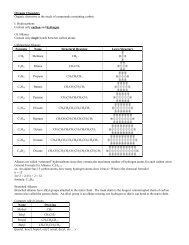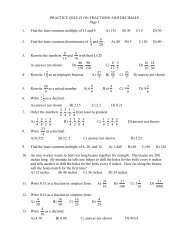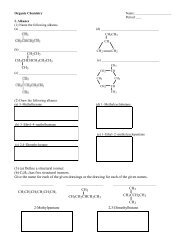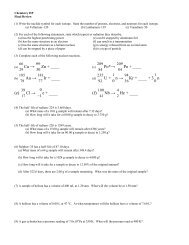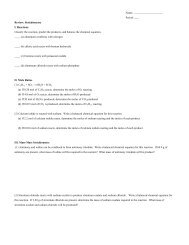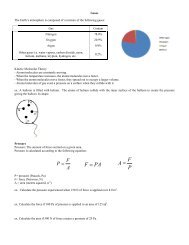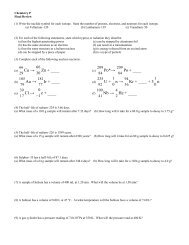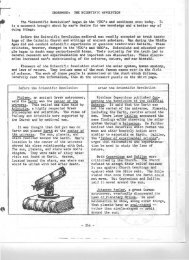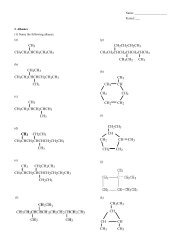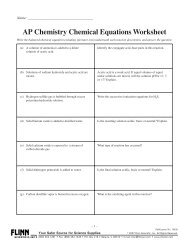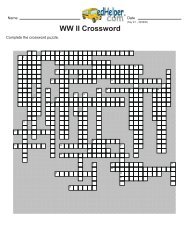- Britain’s less-than-brilliant [to say the least] strategy brings us to…<strong>Am</strong>erican advantages in the war: They were fighting on home soil [makes big difference b/c people fight w/more conviction ifthey are fighting for their land AND they also knew the area as a result]. The colonists also had easier access to supplies and better tactics. Lastly, they didn’t have inanely stupid generals who were only in it for their own personal gloryand consequently didn’t work together like the British did.- On the other hand… They didn’t really have a bureaucracy to organize the war effort like Britain did – they only hadthe Second Continental Congress, which was planned as a brief meeting to talk about theCA but ended up having to be the main intercolonial gov’t. But even though this task wasinitially daunting it worked out after a while – the big ac<strong>com</strong>plishment being their creation of theContinental Army [they chose Washington to lead it] and their management of it. The British had more, better-trained troops and [initially] control of the seas.- In the end France was a big help for the colonists [no kidding huh].*1776: Moving Towards Independence*- Remember that, initially, even when Britain and the <strong>Am</strong>ericans were fighting, independence had not beendecided upon yet [not everyone agreed w/that radical course of action].- In January 1776, a huge step towards the decision to declare independence was taken when ThomasPaine released his book, Common Sense, which was an instant bestseller and had an enormous impact b/cof its challenge of colonial assumptions about the colonies’ relationship to Britain.- Largely b/c of Common Sense, by late spring in 1776 independence had be<strong>com</strong>e inevitable. On May 10the Second Continental Congress proposed that individual colonies start forming state constitutions, and allthe loyalists dropped out of the CC.- On June 7 some congressmen introduced a motion towards independence. While the vote was postponeduntil July a five-man semi-<strong>com</strong>mittee was established to draft a declaration. Of course, Thomas Jeffersonwas the guy who ended up writing it – and it was adopted on July 4.- The chief importance of the Declaration was its statement of principle [the life, liberty and happiness thing]and the explanation of gov’t being based on the consent of the people. After the Declaration was signed,there really was no turning back – b/c the delegates had <strong>com</strong>mitted treason.*The War: A Quick Overview*- Now, we don’t really need to know the specifics on the war, so this is just going to be the basics. The warhad three phases b/c of changes in British strategy. They were as follows:1. [1776 – late 1777] Containment in New England – the British initially believed that therevolution was basically a radical minority movement centered in New England so theyconcentrated their forces there. But then came The Battle of Bunker Hill and…2. [late 1777 – early 1778] Middle Colonies – the British realized it was not going to be thateasy, so they shifted down into the middle colonies in an attempt to divide the colonies bygaining control of the Hudson River and Mohawk Valley. Then after the debacle at Saratoga(1778), which also caused the French to join the colonists b/c they realized they actually had achance, they gave up on that and made a last ditch effort in…3. [early 1778 – 1781] The South – they hoped to get loyalist support and use supplies from theWest Indies to win in the South. They took Charlestown, but since the French were there toback the colonists up in the sea it didn’t help them much. The very last stages of the war werevery bloody and desperate, culminating in Yorktown (1781) where a trapped Cornwallissurrendered and the war ended.- There’s a lot more specific stuff on this but since we don’t need to know it, who cares?*1782: The Treaty of Paris*- The <strong>Am</strong>ericans soon disregarded their instructions from their leaders to follow the French b/c they[correctly] realized that the French were not so much their allies as they were Britain’s enemies, if you knowwhat I mean.- The gamble paid off, though, b/c with Ben Franklin leading the negotiations the treaty, which was signedon September 3, 1783 included their two must-have goals: (1) recognition as an independent nation and (2)firm national boundaries from the Mississippi to the Atlantic and from Canada to Florida.- Of their non-essential goals, they didn’t get the one about (!) annexing Canada [you think] but did gainaccess to the fisheries in Newfoundland [they had requested access to all British fisheries in Canada].14
- So, by 1782, what had seemed to be a distant dream a few years earlier had be<strong>com</strong>e reality [I had to endthis with one of those corny type sayings, just like the textbook – sorry].From the Articles of Confederation to the Constitution (1776 – 1789)*Varieties of Republicanism*- Although most <strong>Am</strong>ericans after the war felt that their country should be a republic, and that its citizensshould be virtuous to maintain the republic’s stability, there were three different interpretations of the conceptof republicanism… One was mainly held by the educated elite [ex. the Adams family] and emphasized thenecessity of a small, homogenous republic in which the citizens would be willing to sacrificetheir own private interests for the good of the whole. In return for sacrifices equality ofopportunity would prevail, eventually creating a merit-based “natural aristocracy.” Another was held by other members of the elite and some skilled craftsman [ex. AlexanderHamilton] and was more about economics, drawing on Adam Smith’s theories about individualself-interest leading for the best for the <strong>com</strong>munity. It stated that if everyone followed theirprivate interests republican virtue would be achieved.Yet another was held by less educated people and some radicals [ex. Thomas Paine] andemphasized widening participation in gov’t in order to give ordinary people more of a say (theegalitarian approach).- All three approaches still shared the concept of the contrast between corrupt Britain and industrious<strong>Am</strong>erica and felt that the republic could only succeed through hard work and virtue.*Creating a Virtuous Republic*- Since pretty much everyone was sure that <strong>Am</strong>erica could only work if the citizens were virtuous, artists,educators, and politicians began trying to inculcate values into people. For instance…- In art they had a tough time b/c to many <strong>Am</strong>ericans art was an example of corruption and luxury.Nevertheless, artists tried to show virtue and nat’lism in their work.- For example: William Hill Brown wrote The Power of Sympathy (1789) to warn women about seduction;Royall Tyler wrote The Contrast (1787) about good vs. bad behavior; and the most popular book of the timewas Mason Locke Weem’s Life of Washington (1800) w/the cherry tree myth, etc.; Gilbert Stuart andCharles Willson Peale painted portraits of good republican citizens; John Trumbull painted history battlescenes; Thomas Jefferson set the standard for <strong>Am</strong>erican architecture by suggesting imitation Romanbuildings w/simplicity of line, harmonious proportions and a feeling of grandeur.- In education two major changes reflected the new concern for raising good citizens: (1) some northernstates began using tax money to support public elementary schools and (2) schooling for girls wasimproved. Judith Sargent Murray was the big theorist on women’s education – she claimed that men andwomen were equally intelligent and that it was only the difference in education that made women appearstupider. So, she concluded, girls should receive the same education as boys.- There was also a rethinking of women’s roles in general due to their contributions in the war. The new POVon women in a republic society is best expressed by Abigail Adams’ letter to her husband stating womendeserved equal rights (remember the ladies). Overall, however, <strong>Am</strong>ericans still saw women as housewivesand as (b/c of their selflessness) the embodiment of republican virtue and sacrifice.*The First Emancipation*- Naturally, there was that other contradiction…slavery. Everybody saw this, including the slaves, some ofwho created petitions (which were ignored).- So in the North the “gradual emancipation” began: in 1777 Vermont abolished slavery, in the 1780sMassachusetts courts decided their constitution prohibited it as well, in 1780 and 1804 respectivelyPennsylvania and New Jersey adopted gradual emancipation laws.- In the South, however, slavery was the backbone of the economy and was consequently not affected byRevolutionary ideology. Even in the North there was a concern for property, which was why it was gradual,not immediate…but in the South, it was out of the question.- Nevertheless, the number of free blacks grew a lot after the Revolution due to escapes during the war,slaves serving in the army, or slaves being freed by their owners (in the Chesapeake this was due toeconomic changes such as the shift from tobacco to grain, which was less labor intensive).- The freed slaves mostly migrated towards Northern cities, but even there emancipation didn’t bringequality, as laws discriminated against blacks. So blacks formed their own institutions (schools, churches,etc.) and joined together in semi-separate <strong>com</strong>munities.15
- Page 3 and 4: Congregationalists (Puritans) - The
- Page 5 and 6: - So the Restoration Colonies, form
- Page 7 and 8: - So in England, where they were lo
- Page 9 and 10: *Colonial Politics 1700-1750: Relat
- Page 11 and 12: - Another ideology that was beginni
- Page 13: - The Quebec Acts were passed aroun
- Page 17 and 18: on the economic side, since the gov
- Page 19 and 20: - Anyway, Congress had several ques
- Page 21 and 22: - Adams was still in the early Wash
- Page 23 and 24: *Political Factionalism and Jeffers
- Page 25 and 26: - Samuel Slater set up the first te
- Page 27 and 28: - Court rulings extended the powers
- Page 29 and 30: Revival, Reform and Politics during
- Page 31 and 32: - Anyhow, during his administration
- Page 33 and 34: TEXAS (Southerners) - Texas had bee
- Page 35 and 36: - Anyhow, Pierce’s total support
- Page 37 and 38: They had a smaller everything: smal
- Page 39 and 40: - The two Northern victories at the
- Page 41 and 42: - The result was the Fourteenth Ame
- Page 43 and 44: The Slaughter-House Cases (1873) -
- Page 45 and 46: in the arrest of 8 immigrant radica
- Page 47 and 48: case (1897 - ICC can’t set rates)
- Page 49 and 50: - The Populists prepared to run aga
- Page 51 and 52: - MOST IMPORTANTLY, though, was the
- Page 53 and 54: - So, what led the US to undertake
- Page 55 and 56: - The rebellion, led by Emilio Agui
- Page 57 and 58: - Still, Americans managed to turn
- Page 59 and 60: - So - the point of this episode? B
- Page 62 and 63: *Hoover’s Response*- Poor Herbert
- Page 64 and 65:
- In FDR’s second term, however,
- Page 66 and 67:
Dominican Republic - When we left i
- Page 68 and 69:
World War II (1941 - 1945)*The Cour
- Page 70 and 71:
- So Truman started off again all c
- Page 72 and 73:
- First of all, the 1950s were (for
- Page 74 and 75:
peace w/Japan that ended occupation
- Page 76:
- France wanted out, so at the Gene



